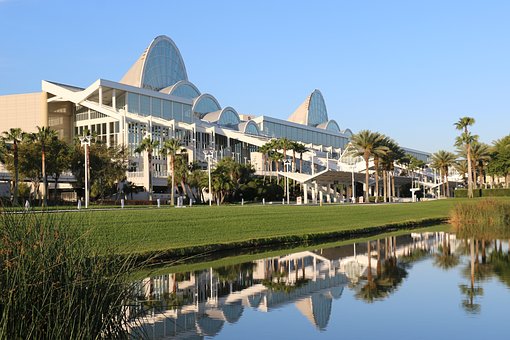When discussing central Florida, it’s difficult not to mention Orlando, which is a lively and unique city situated in the middle of the state.
Although Orlando is best known for its many theme parks, there are countless other aspects of this city to discover.
From gorgeous lakes to exciting nightlife, living in Orlando delivers the ideal balance of natural beauty, convenience, and entertainment.
However, like any other city, there are numerous pros and cons to living there.
To take a deep dive into the advantages and disadvantages of living in Orlando, keep reading!

Contents
Pros of Living in Orlando, FL
1. Beautiful Neighborhoods
The best areas of Orlando are incredibly accessible and beautiful.
College Park is right in the middle of the action, near small businesses and award-winning downtown restaurants.
Lake Eola Heights Historic District is a wonderful place for history buffs due to the diverse architecture from art deco to the Mediterranean revival.
Mills 50 is an up-and-coming neighborhood with new restaurants, yoga studios, and a thriving art scene.
Parramore offers affordable housing and authentic food with excellent culture, community, and street art.
Finally, Sanford offers a more suburban lifestyle that is considered one of the top places in the state to live.
2. Centrally Located
Whether you utilize mass transit or decide to drive, Orlando is an incredibly accessible central Florida location for moving around the state.
Just a two-hour drive north will put you in Jacksonville, which has one of the largest urban park systems in the U.S. and is right on the Atlantic Coast.
While getting down to the Florida Keys will take you a little longer, it is still within a day’s drive.
The charming and historic Fort Myers is just a three-hour drive southwest, while the vibrant city of Miami is only a few hours away as well.
Tampa is right up the road and a great place to catch a professional sporting event.
3. Decent Mass Transit
When considering Florida, you think you will need a car, but that’s not the case in Orlando.
Although the city is not considered walkable, there are numerous mass transit options to help you navigate life, including Amtrak, Greyhound, the commuter SunRail, LYMMO, and the Lynx public bus system.
Orlando has been ranked Florida’s second-best city for mass transit, immediately behind Miami.
If considering moving there without a car, just look for a well-served neighborhood to leave your car behind.
4. Extensive Attractions
Orlando is not only about the attractions, but they are part of the appeal.
This city is home to countless exciting spots loved by residents and tourists, such as the Crayola Experience, Disney’s Hollywood Studios, Madame Tussauds, SeaWorld, The Wizarding World of Harry Potter, Universal Studios, and Walt Disney World.
If you are a fan of pop culture, lively entertainment, and amusement parks, then Orlando is a great place to be.
5. Growing Job Market
Tourism has helped the local economy flourish, especially in the hospitality and restaurant industries.
This has opened the doors for other sectors beyond tourism, including aerospace, agriculture, aviation, digital media, engineering, film and television production, and software design.
Some of the largest employers in the area are Disney World and Universal Studios, local hospitals, and Lockheed Martin.
6. Low Cost of Living
One of the main advantages of living in Orlando is the affordable cost of living.
The city earns 104.1, which is only slightly higher than the national average of 100.
Compared to most other major U.S. metropolitan areas, this is significantly lower.
Miami has a 123.1 index, while NY has 187.2, and Los Angeles comes in at 173.3.
One of the most critical aspects of this low cost is the housing market, with a median home price of $294,000.
7. Natural Beauty
The ocean is not far from Orlando and the state parks are plentiful.
If you love watersports, then moving to Orlando is the right decision since swimming, diving, sailing, and yachting are plentiful in the ocean or many lakes.
Also, Orlando has and is close to plenty of nature exploration, including rivers, springs, hiking trails, and camping locations.
This is ideal for families who want to get away for the weekend or young professionals who want to get out on the water!
8. No State Tax
When you choose to move to Orlando, you will save a significant amount of money on state taxes.
In other states, income tax could be as much as 3-5% or more.
Saving on a state income tax could mean a savings of thousands of dollars, depending on your job.
If you are considering moving, then these savings should be added to your budget and major consideration.
Cons of Living in Orlando, FL
1. Droves of Tourists
With all the thrilling activities that Orlando has to offer come tourists from across the globe looking to experience them.
When living in Orlando, you become accustomed to the hordes of visitors that arrive year-round, plus the snowbirds from the north in the winter.
With approximately 76 million tourists visiting every year, life can become a little trickier for locals.
Residents must expect increased traffic, inexperienced drivers, large crowds, and long lines for businesses and attractions.
2. Endless Urban Sprawl
Getting around Orlando by car can be difficult because of the droves of tourists, but also because of the endless urban sprawl.
Unlike a smaller city in central Florida, Orlando is incredibly spread out, so you will need to drive greater distances, which makes congestion much more of a challenge.
Also, while mass transit is decent, you cannot reach every place without a car.
3. Hazardous to your Wallet
While the cost of living is decent, one major downside of living in such a fun city is you could easily blow your entertainment budget.
Many of the area’s attractions and some nightlife venues are incredibly expensive, so you can ring up a huge bill if you’re not careful.
That means you must keep your fun times in moderation to avoid going broke in the first month of your residence!
4. Low Minimum Wage
Although the cost of living in Orlando is cheap, it comes at the price of a lower minimum wage compared to other U.S. cities.
In 2021, the minimum wage was $8.56 per hour, which is still higher than the federal minimum wage of $7.25, but much lower than $15 per hour in other cities.
The good news is the city plans to increase the minimum wage to $15 per hour by 2026 to keep up with increasing inflation predictions.
5. Plentiful Hurricanes
Hurricane season in Florida runs from around June 1st to November 30th.
Although Orlando is not a coastal city, it is often in the direct path of or subjected to the harsh winds and heavy rains from the hurricane bands.
Since 1930, Orlando has been hit directly by 77 hurricanes, which is less than one per year.
6. Poor Schools
In general, the City of Orlando doesn’t earn high honors in the public school system.
Although it is not the worst in the country, there is significant room for improvement.
Within the State of Florida, Orlando schools fall in the bottom 50% of all public schools and scored lower than the state average in reading and math proficiency.
However, Orlando is home to the University of Central Florida, which has a 75% graduation rate.
This means the city is better for young professionals looking to advance their career and education, as opposed to families with small children.
7. Uncomfortable Humidity
Although Florida has sunshine and warm temperatures throughout the year, the weather is not an advantage in Orlando.
With an average year-round humidity of 74%, the weather can be overbearing.
Even on the driest days, the humidity rarely drops below 50%.
Luckily, most restaurants, workplaces, and apartments have air conditioning.

Pros and Cons of Living in Orlando, FL – Summary Table
| Pros of Living in Orlando, FL | Cons of Living in Orlando, FL |
|---|---|
| 1. Beautiful Neighborhoods | 1. Droves of Tourists |
| 2. Centrally Located | 2. Endless Urban Sprawl |
| 3. Decent Mass Transit | 3. Hazardous to your Wallet |
| 4. Extensive Attractions | 4. Low Minimum Wage |
| 5. Growing Job Market | 5. Plentiful Hurricanes |
| 6. Low Cost of Living | 6. Poor Schools |
| 7. Natural Beauty | 7. Uncomfortable Humidity |
| 8. No State Tax |
Orlando Safety Overview
READ THE FULL REPORT: Orlando Safety Review
Safety Index:
- OVERALL RISK: MEDIUM
- TRANSPORT & TAXIS RISK: MEDIUM
- PICKPOCKETS RISK: MEDIUM
- NATURAL DISASTERS RISK: MEDIUM
- MUGGING RISK: LOW
- TERRORISM RISK: LOW
- SCAMS RISK: LOW
- WOMEN TRAVELERS RISK: MEDIUM
Frequently Asked Questions
Is Orlando generally a good place to live?
Orlando consistently proves to be a wonderful place to live for a variety of individuals, looking for different lifestyle types.
Retirees enjoy the area because of the weather, sun, cost of living, and calm nature of Orlando, outside of the touristy areas.
The growing technology sector is causing the population to increase, so the more urban sections of Orlando make it an excellent destination for young professionals as well as families in search of year-round entertainment, a booming economy, and quality educational opportunities.
Is purchasing property in Orlando a worthwhile investment?
In 2021, Orlando was ranked as one of the best places in the U.S. to purchase a property.
The criteria behind this determination include the job market, growing population, affordable real estate, and cash flow.
The most popular rental market in the Orlando metro area is the multifamily segment.
Is it easy to find a job in Orlando?
Depending on your industry, finding a job could be easy or difficult.
Tourism is one of the most booming industries in Orlando because of Universal Studios and Disney.
With the emergence of the technology sector, jobs in this field are plentiful.
Additionally, to support the booming population, the healthcare industry is growing in this area of Florida.
What are the important considerations before moving to Orlando?
Those looking to move to Orlando must consider the weather, wildlife, housing market, and cost of living.
Other factors to consider include the diversity of cuisine, population growth of certain areas, employment opportunities, insurance, and retirement communities, depending on the lifestyle you wish to lead.
Why is housing generally inexpensive around Orlando?
When an area has a lot of lands to build, prices generally tend to be cheaper.
South Florida has higher prices because the coastline is highly developed and the western boundary with the Everglades equates to a scarcity of land.
The rest of the state, including the Orlando area, has much lower prices for homes and land.












The city has beautiful neighborhoods, is centrally located, and has decent mass transit. However, the high number of tourists, endless urban sprawl, and low minimum wage are some drawbacks to consider.
Orlando offers a unique and lively atmosphere with a balance of natural beauty, convenience, and entertainment, but it also has its drawbacks, such as high tourism traffic and urban sprawl.